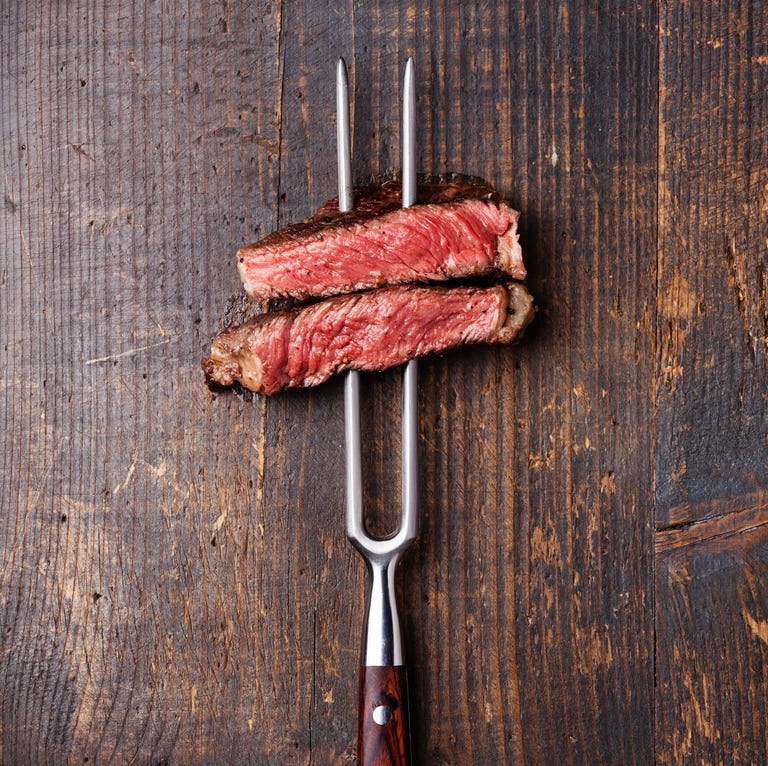The argument has reached red alert. That’s bad for everyone.

By Paul Kita

LisovskayaGetty Images
It seems that once every decade, society takes aim at a particular food or food group.
In the ’80s, dietary fat played the role of victim. In ’90s, sodium joined fat to become a nutritional villain du jour. In the 2000s, carbohydrates stepped into the searchlight. And now in the 2010s, meat has turned into The Nutrition Evil That Shall Not Be Named.
As if all of the debate over the term “plant-based,” the proliferation of faux-teins, and the klaxon calls of reinvigorated vegans weren’t enough, late yesterday a study published in Annals of Internal Medicine further complicates the meat debate.
The report, which is actually a collection of five reviews, was assembled by a 14-member panel from seven countries. The scientists analyzed data, in total, from 76 trials that contained more than 800,000 study participants. The authors reported no conflicts of interest. Their primary finding, quoted directly from the study:
First, the certainty of evidence for the potential adverse health outcomes associated with meat consumption was low to very low, supported by the similar effect estimates for red meat and processed meat consumption from dietary pattern studies as from studies directly addressing red meat and processed meat intake.
Second, there was a very small and often trivial absolute risk reduction based on a realistic decrease of 3 servings of red or processed meat per week.
Credentialed authorities, many of whom are on Men’s Health Advisory Board, have come out against the report, stating that the research is “irresponsible” and “contributes to a culture of consumer confusion.”
It’s head-spinning, all of this nutritional whiplash.
And, ultimately, it’s bad for nutrition.
“Eating is incredibly complex,” says Brian St. Pierre, M.S., R.D., C.S.C.S., Director of Performance Nutrition at Precision Nutrition. “Even on a purely physiological basis, there are many ways to eat healthy and well. Let alone to maximize health, or performance, or body composition, or environmental sustainability, or satisfy personal eating preferences.”

Hero Images
By making the debate all about meat—or fat or sodium or carbs—experts divide people into two camps. These camps, history shows (see: low-fat, low-sodium, low-carb), often polarize the debate and eventually turn into warring factions. The average consumer, caught in the middle, suffers collateral damage.
The truth isn’t at either end of the extreme and the extremity of nutritional debates may cause consumers to tune out. If science says red meat is bad for your health one week and then another study says red meat isn’t bad for your health another week, why should consumers pay attention to the science at all?
And why isolate red meat when a healthful diet is a far more complex than excluding—or even limiting—one particular type of food?
St. Pierre continues: “When you get these camps telling you that their way is the only way, or clearly the best way, and other ways are not only wrong but harmful, and this message directly conflicts with other persuasive or compelling camps, then clients get confused or discouraged, coaches don’t acquire the appropriate skills/mindset required, and people don’t actually get the help they need.”

10'000 Hours Advertisement – Continue Reading Below
The meat vs. some meat vs. no meat creates a micro view of nutrition, which is, by nature, a macro topic. Most credible dietitians will tell you that you can eat a healthful diet that includes meat, and you can eat a healthful diet that includes very little (or no) meat. The best diets look at the whole, not the parts.
The best diets, research shows, are inclusionary—focused on expanding the number of healthful foods you consume—instead of exclusionary.
The best diets allow space for at least the possibility of beef, chicken, eggs, fish, dark leafy greens, tropic fruit, whole grains, coffee, tea, herbs, seafood, root vegetables, squash, potatoes, butter, duck fat, olive oil, tomatoes, eggplant, nuts, dairy products, pasta, berries, and, yeah, even fast food every now and then.
Researchers and experts will continue to squabble about meat and nutrients and the finer details of this landmark Annals of Internal Medicine study for weeks and perhaps decades to come.

VioletaStoimenova
But there’s also something interesting embedded as the conclusion to the study itself: “This assessment may be excessively pessimistic; indeed, we hope that is the case. What is certain is that generating higher-quality evidence regarding the magnitude of any causal effect of meat consumption on health outcomes will test the ingenuity and imagination of health science investigators.”
In short, maybe we need to ask more of the experts doing the squabbling.

THANKS JEFF FOR THIS ,,,,
BUT, IT IS STILL OR ALL OF US COMPLEX. OVER THE YEARS THERE HAS BEEN STUDIES ABOUT ALL MANNER OF FOODS AND ITEMS THAT HAVE GONE FROM
GOOD TO BAD AND BAD TO GOOD, THUS COMPLICATING OUR ABILITY TO EVALUATE AND DISCERN.
SUCH THEN ENTERS INTO MARKETING AND ADVERTISING AND A EXPLOSION OF CONFUSION OCCURS,,, WHICH IMPEDES OUR CAPACITY TO DISCERN THE WHOLE TRUTH THAT WE USE TO MAKE OUR DECISIONS.
BE SURE YOU PRAY OVER WHAT YOU EAT AND ASK GOD TO BLESS IT AND YOUR HEALTH AND YOUR FAMILY.
BISHOP.